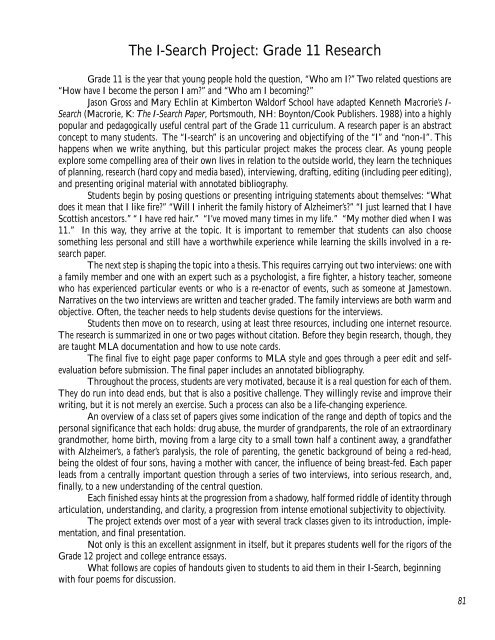Colloquium on English - Research Institute for Waldorf Education
Colloquium on English - Research Institute for Waldorf Education
Colloquium on English - Research Institute for Waldorf Education
Create successful ePaper yourself
Turn your PDF publications into a flip-book with our unique Google optimized e-Paper software.
The I-Search Project: Grade 11 <strong>Research</strong><br />
Grade 11 is the year that young people hold the questi<strong>on</strong>, “Who am I?” Two related questi<strong>on</strong>s are<br />
“How have I become the pers<strong>on</strong> I am?” and “Who am I becoming?”<br />
Jas<strong>on</strong> Gross and Mary Echlin at Kimbert<strong>on</strong> <strong>Waldorf</strong> School have adapted Kenneth Macrorie’s I-<br />
Search (Macrorie, K: The I-Search Paper, Portsmouth, NH: Boynt<strong>on</strong>/Cook Publishers. 1988) into a highly<br />
popular and pedagogically useful central part of the Grade 11 curriculum. A research paper is an abstract<br />
c<strong>on</strong>cept to many students. The “I-search” is an uncovering and objectifying of the “I” and “n<strong>on</strong>-I”. This<br />
happens when we write anything, but this particular project makes the process clear. As young people<br />
explore some compelling area of their own lives in relati<strong>on</strong> to the outside world, they learn the techniques<br />
of planning, research (hard copy and media based), interviewing, drafting, editing (including peer editing),<br />
and presenting original material with annotated bibliography.<br />
Students begin by posing questi<strong>on</strong>s or presenting intriguing statements about themselves: “What<br />
does it mean that I like fire?” “Will I inherit the family history of Alzheimer’s?” “I just learned that I have<br />
Scottish ancestors.” “ I have red hair.” “I’ve moved many times in my life.” “My mother died when I was<br />
11.” In this way, they arrive at the topic. It is important to remember that students can also choose<br />
something less pers<strong>on</strong>al and still have a worthwhile experience while learning the skills involved in a research<br />
paper.<br />
The next step is shaping the topic into a thesis. This requires carrying out two interviews: <strong>on</strong>e with<br />
a family member and <strong>on</strong>e with an expert such as a psychologist, a fire fighter, a history teacher, some<strong>on</strong>e<br />
who has experienced particular events or who is a re-enactor of events, such as some<strong>on</strong>e at Jamestown.<br />
Narratives <strong>on</strong> the two interviews are written and teacher graded. The family interviews are both warm and<br />
objective. Often, the teacher needs to help students devise questi<strong>on</strong>s <strong>for</strong> the interviews.<br />
Students then move <strong>on</strong> to research, using at least three resources, including <strong>on</strong>e internet resource.<br />
The research is summarized in <strong>on</strong>e or two pages without citati<strong>on</strong>. Be<strong>for</strong>e they begin research, though, they<br />
are taught MLA documentati<strong>on</strong> and how to use note cards.<br />
The final five to eight page paper c<strong>on</strong><strong>for</strong>ms to MLA style and goes through a peer edit and selfevaluati<strong>on</strong><br />
be<strong>for</strong>e submissi<strong>on</strong>. The final paper includes an annotated bibliography.<br />
Throughout the process, students are very motivated, because it is a real questi<strong>on</strong> <strong>for</strong> each of them.<br />
They do run into dead ends, but that is also a positive challenge. They willingly revise and improve their<br />
writing, but it is not merely an exercise. Such a process can also be a life-changing experience.<br />
An overview of a class set of papers gives some indicati<strong>on</strong> of the range and depth of topics and the<br />
pers<strong>on</strong>al significance that each holds: drug abuse, the murder of grandparents, the role of an extraordinary<br />
grandmother, home birth, moving from a large city to a small town half a c<strong>on</strong>tinent away, a grandfather<br />
with Alzheimer’s, a father’s paralysis, the role of parenting, the genetic background of being a red-head,<br />
being the oldest of four s<strong>on</strong>s, having a mother with cancer, the influence of being breast-fed. Each paper<br />
leads from a centrally important questi<strong>on</strong> through a series of two interviews, into serious research, and,<br />
finally, to a new understanding of the central questi<strong>on</strong>.<br />
Each finished essay hints at the progressi<strong>on</strong> from a shadowy, half <strong>for</strong>med riddle of identity through<br />
articulati<strong>on</strong>, understanding, and clarity, a progressi<strong>on</strong> from intense emoti<strong>on</strong>al subjectivity to objectivity.<br />
The project extends over most of a year with several track classes given to its introducti<strong>on</strong>, implementati<strong>on</strong>,<br />
and final presentati<strong>on</strong>.<br />
Not <strong>on</strong>ly is this an excellent assignment in itself, but it prepares students well <strong>for</strong> the rigors of the<br />
Grade 12 project and college entrance essays.<br />
What follows are copies of handouts given to students to aid them in their I-Search, beginning<br />
with four poems <strong>for</strong> discussi<strong>on</strong>.<br />
81

















